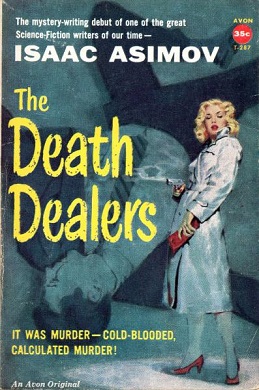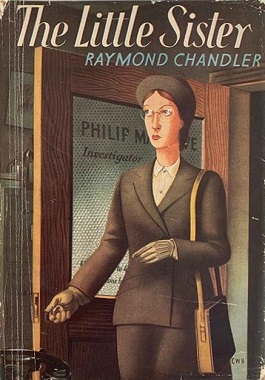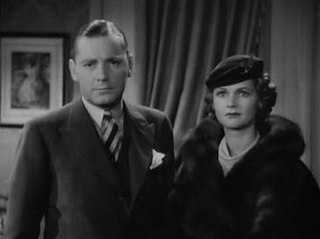
Murder One is an American legal drama television series that aired on ABC from September 19, 1995, until May 29, 1997. The series was created by Steven Bochco, Charles H. Eglee, and Channing Gibson.

The Death Dealers is a 1958 mystery novel by American writer Isaac Asimov. It is about a university professor whose research student dies while conducting an experiment. The professor attempts to determine if the death was accident, suicide or murder.

The Little Sister is a 1949 novel by Raymond Chandler, his fifth featuring the private investigator Philip Marlowe. The story is set in Los Angeles in the late 1940s and follows Marlowe's investigation of a missing persons case and blackmail scheme centered around a Hollywood starlet. With several scenes involving the film industry, the novel was partly inspired by Chandler's experience working as a screenwriter in Hollywood and his low opinion of the industry and most of the people in it. The book was first published in the UK in June 1949 and was released in the United States three months later.

Eye for an Eye is a 1996 American psychological thriller film, directed by John Schlesinger and written by Rick Jaffa and Amanda Silver. It stars Sally Field, Kiefer Sutherland, Ed Harris, Beverly D'Angelo, Joe Mantegna and Cynthia Rothrock. The story was adapted from Erika Holzer's novel of the same name. The film opened on January 12, 1996.
"Somnambulist" is the 11th episode of the first season of the American television series Angel.
Stella Maudine Nickell is an American woman who was sentenced to ninety years in prison for product tampering after she poisoned Excedrin capsules with lethal cyanide, resulting in the deaths of her husband Bruce Nickell and Sue Snow, a stranger. Her May 1988 conviction and prison sentence were the first under federal product tampering laws instituted after the 1982 Chicago Tylenol murders.

And Be a Villain is a Nero Wolfe detective novel by Rex Stout, first published by the Viking Press in 1948. The story was collected in the omnibus volumes Full House and Triple Zeck.

Debra Charlotte Morgan is a fictional character created by Jeff Lindsay for his Dexter book series. She also appears in the television series, based on Lindsay's books, portrayed by Jennifer Carpenter. In Lindsay's novels, she first appeared in Darkly Dreaming Dexter and was featured in every novel in the series. Debra is the sister of the series' antihero protagonist Dexter Morgan.

Curtains is a musical mystery comedy with a book by Rupert Holmes, lyrics by Fred Ebb, and music by John Kander, with additional lyrics by Kander and Holmes.

Mr. Monk and the Blue Flu is the third novel by writer Lee Goldberg based on the television series Monk. In this novel, in response to a blue flu, the mayor of San Francisco reinstates several police officers who suffer from debilitating mental issues, including Adrian Monk. The squad of half-crazy detectives must contend not only with each other's eccentricities and a series of murders linked only by missing left shoes and shared birth dates, but their former friends on the other side of the labor dispute. Like the previous two books, the book is narrated by Natalie Teeger, Monk's assistant.

Angels Flight is the eighth novel by American crime author Michael Connelly, and the sixth featuring the Los Angeles detective Hieronymus "Harry" Bosch.

Komisario Palmun erehdys is a 1960 Finnish crime comedy film directed by Matti Kassila for Suomen Filmiteollisuus. It is set in 1930s Helsinki and centers on Inspector Palmu's investigation of the murder of rich and decadent Bruno Rygseck. It is based on Mika Waltari's 1940 novel of the same name, and was the first film adaptation of his Inspector Palmu novels.
Personal Call is a half-hour radio play written by Agatha Christie and first performed on the BBC Radio Light Programme on Monday, 31 May 1954. The play reuses the character of Inspector Narracott from the 1931 novel The Sittaford Mystery.

"Mr. Monk and the End" is the two-part series finale of the American comedy drama detective television series Monk. It consists of the fifteenth and sixteenth episodes of the eighth and final season, and the 124th and 125th episodes of the series overall. The series follows Adrian Monk, a private detective with obsessive–compulsive disorder and multiple phobias, and his assistant Natalie Teeger. In the finale, Monk finally solves his wife Trudy's murder after twelve years, concluding an eight-season long arc.

I Killed That Man is a 1941 American mystery film directed by Phil Rosen and starring Ricardo Cortez, Joan Woodbury and Iris Adrian. Produced by the King Brothers for release by Monogram Pictures, it is a remake of the 1933 film The Devil's Mate which Rosen had also directed.

Up in the Air is a 1940 American comedy mystery film directed by Howard Bretherton and starring Frankie Darro, Marjorie Reynolds and Mantan Moreland. It was produced and released by Monogram Pictures. It was remade in 1945 as There Goes Kelly.

The Solitaire Man is a 1933 American pre-Code drama film directed by Jack Conway and starring Herbert Marshall and Mary Boland.
"Christmas Party" is a Nero Wolfe mystery novella by Rex Stout, first published as "The Christmas-Party Murder" in the January 4, 1957, issue of Collier's magazine. It first appeared in book form in the short-story collection And Four to Go, published by the Viking Press in 1958.













